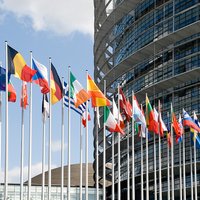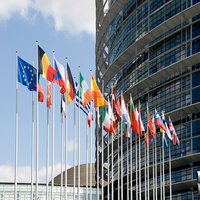Wuppertal Institute at the UN Climate Change Conference
Side events at COP23 give impetus to key future topics

Side events at COP23 give impetus to key future topics

The United Nations Climate Change Conference COP23 will be held in Bonn from 6 to 17 November 2017. The Wuppertal Institute has been continuously observing the on-going negotiations since the beginning of the UN climate process and analysing the outcomes. As part of the accompanying events at COP23, it will be presenting its research and discussing specific ways to implement the Paris climate accord. In addition, numerous side events will be held on key future topics, which the Wuppertal Institute will use to provide impetus.
Wuppertal, 6 November 2017: In November, the world will turn its eyes to Bonn where the 23rd Conference of the Parties (COP) of the United Nations Framework Convention on Climate Change (UNFCCC) will take place. Over 20,000 representatives from the worlds of diplomacy, politics and civil society are expected to attend this UN Climate Change Conference.
Not only present but right in the thick of it, the scientists of the Wuppertal Institute have been observing the on-going negotiations, regularly evaluating the outcomes from an independent perspective and making their findings available to the public since the start of the UN climate process at the beginning of the 1990s.
Implementing Paris: negotiating the "small print"
With the Paris climate accord it appeared that a breakthrough had finally been achieved after a quarter of a century of international climate diplomacy: a global agreement in which all states agree to contribute to the climate protection efforts. "The COP now has to show that, despite the US having announced its withdrawal, the climate protection process will continue to remain on course," says Lukas Hermwille, research fellow with the Energy, Transport and Climate Policy Research Group, Wuppertal Institute. Laying the foundations for the detailed policy for the Paris Agreement in Bonn will prove a particular challenge. The intention is to adopt this "small print" at COP24 in Poland next year. However, the vital groundwork required for this has to be established now. Central building blocks include the structuring of the so-called transparency mechanism and requirements for structuring the Nationally Determined Contributions (NDCs). Such requirements do not currently exist and overall, the national targets are not very transparent and difficult to compare with one another. "The detailed rules will determine whether the accord retains what we have expected it to since Paris, or whether it will become a toothless paper tiger," emphasises Lukas Hermwille, adding that "without the US as a strong negotiating partner, this will already be much more difficult, because under President Obama, the US was one of the pioneers in terms of transparency."
The United States – from pioneer to brakeman?
The role the US will play is still completely unknown. It is conceivable that it will react with some reserve, but it could just as well actively disrupt the process. "In this case, it will be important for the other states to form a united front. Politically, the greatest responsibility lies with the European Union, because it is the only one with the necessary resources and influence to fill the vacuum left behind by the US," says Wolfgang Obergassel, Project Co-ordinator of the Energy, Transport and Climate Policy Research Group, Wuppertal Institute. It is also conceivable that the US will appear to be cooperative, but demand renegotiations to the Paris Agreement. The other states should also close ranks in this case. "The Paris Agreement allows its member states as much freedom as possible with regard to their Nationally Determined Contributions," explains Obergassel. "The request for renegotiations therefore appears to be a pure delaying tactic intended to slow down the dynamics of the process – particularly as the US has not yet specified exactly what it intends to renegotiate."
Mobilising and incorporating non-governmental stakeholders
"With the withdrawal of the US, integrating the great potential of non-governmental stakeholders, and in particular those on a sub-national level, such as the German federal state of North Rhine-Westphalia or the US federal states, will become even more important," says Prof. Dr. Hermann E. Ott, Senior Advisor Global Sustainability and Welfare Strategies, Wuppertal Institute. This is expected to be a particular challenge for the UNFCCC process, which is traditionally driven by the member states. So far, such integration has only occurred on the periphery of the negotiations. The German federal states can also play a central role in this regard and provide important impetus. Prof. Ott adds that "creative solutions must be found for how non-governmental stakeholders can drive forward the parties to the accord within the climate regime and review their performance. Integration within potential pioneer alliances outside of the Paris climate accord would also be good way of supporting compliance with the 2-degree target.”
The Wuppertal Institute provides impetus with side events
In parallel to the negotiations, specific solutions for implementing the Paris Agreement and restricting global warming will be presented in the "Bonn Zone" in the Bonn Rheinaue Park. This is where countries, non-governmental organisations (NGOs), international governmental organisations (IGOs), UN organisations, and representatives from science and the economy will present their projects on the subject of climate protection. The side events and exhibitions are a key hub for climate protection, knowledge exchange, capacity building and networking. The Bonn Zone will be open daily during the conference from 08:00 to 22:00. Only registered participants will be granted entrance to the UN conference.
With the NRW Climate Lounge, a new format that will take place daily during the COP in collaboration with the fed?eral state government of North Rhine-Westphalia and EnergieAgentur.NRW, the Wuppertal Institute will address the core implementation issues of the Paris resolutions. At the beginning of the two weeks of negotiations, it will also be clarified which topics will actually be on the agenda in Bonn and what outcomes can be expected from the conference. An initial evaluation of the outcomes of the negotiations will be summarised orally on the last day of the conference, 17 November 2017, on site as part of the NRW Climate Lounge. A few days later, the outcomes will be available in writing, and the detailed analysis report is expected to be ready in December.
With additional side events, the Wuppertal Institute will expand on individual topics and create impetus for the negotiations. These will also address specific areas that have hitherto been somewhat neglected during the climate negotiations – although they are key to implementing the global climate protection targets. This applies, for example, to the discussion on the options for decarbonising energy-intensive industry. "This requires a higher level of energy efficiency, and above all fundamental process changes," says Prof. Dr. Stefan Lechtenböhmer, Director of the Future Energy and Mobility Structures Research Group, Wuppertal Institute. Implementing these in the context of highly competitive markets is a great challenge. The side event "Role of innovation and policy to catalyse deep decarbonisation of energy intensive industries" will therefore involve a discussion on innovations aimed at increasing the spread of energy efficiency and additional process changes in the primary industries and making them more sustainable. The international panel of scientists and representatives of industry and government will address options for interlocking this more closely with international climate policy. The event is organised by the Wuppertal Institute, the University of Lund and the Carbon Trust from the UK.
Another side event that will involve research scientists of the Wuppertal Institute is entitled "A European Perspective: Adequacy of the Paris Agreement towards Facilitating Global Decarbonisation". Up until now, sector-specific governance approaches have not been part of the UN climate regime. This side event will now debate how international governance can contribute to resolving sectoral transformation challenges by means of providing strong signals, agreeing on international rules and standards, transparency mechanisms, providing financial and technical help and mechanisms for knowledge transfer.
Further information on this and numerous other side events in which the Wuppertal Institute is participating and on COP23 itself can be found in the following links.
Press release from the Wuppertal Institute for Climate, Environment and Energy
Responsible for content: Prof. Dr. Uwe Schneidewind, President
Contact details: Christin Hasken, Head of Communications and Public Relations
Tel.: +49 202 2492-187
Fax: +49 202 2492-108
E-Mail: christin.hasken@wupperinst.org
